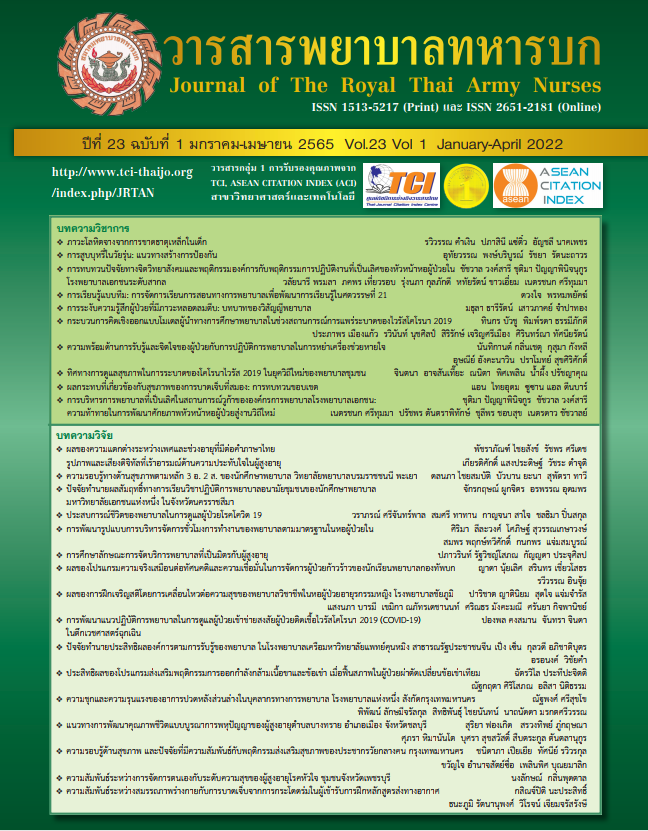Effects of Enhancing Perceived Self-Efficiency for Behavior in Prevention of Complications of Type 2 Diabetic Patients
Keywords:
Enhancing perceived self- efficiency, Behavior in prevention of complication of diabetic, Type 2 Diabetic patientsAbstract
This research was a quasi-experimental design with pretest-posttest control groups. The objectives were to study the effect of enhancing perceived self-efficiency for behavior in prevention of complications of type 2 diabetic patients. The sample group comprised of 60 diabetic patients in a health promoting hospital Bandoo sub-district and in a health promoting hospital nongbua sub-district. The sample were selected by simple random sampling and divided into experimental and control groups with 30 samples in each. The research instruments included the enhancing perceived self-efficiency program, the demographic data form, behavior in prevention of complications of diabetic patients data form with the reliability of .71. Statistics used for data analysis included frequency, percentage, paired t-test, and independent t-test.
The research results revealed that after the experiment, the experimental group had increased posttest behavior in prevention of complications score over their pretest behavior in prevention of complications score, and who were receiving enhancing perceived self-efficiency had higher score on perceived self-efficiency than the group who receiving only routine care with statistical significance .05.
Downloads
References
Diabetes Association of Thailand. Guideline diabetes care 2018. (3rd edition). Romyen media company. 2018. (in Thai)
American Diabetes Association. Classification and diagnosis of diabetes: standards of Medical care in diabetes care 2019; 42 (Supplement 1): S13-S28.
Wutthitham N, Srinoppakun P, Wareeratpakorn T. Selected Factors Related with The Health Literacy in Blood Glucose Level Controlling of Patients with Type 2 Diabetes. Journal of The Royal Thai Army Nurses. 2021; 22(2): 252-259. (In Thai)
Strategy and planning division. Thai health stat. Bangkok: Ministry of public Health; 2020. (in Thai).
Manns B, Hemmelgarn B, Tonelli M, Au F, So H, Weaver R, et al. The cost of care for People with chronic kidney disease. Canadian journal of kidney health and disease 2019; 1-11.
Department of Disease Control. World Diabetes Campaign. Bangkok: Ministry of public Health; 2019. (in Thai).
Pimpachai K, Yimwilai C. Individual Aptitude Factors Related to Participation of Village Health Volunteers Operating Thailand Healthy Lifestyle Strategic Plan, year 2011-2020, At Ministry of Public Health, KaengKhoi Health Promoting Hospital, Saraburi Province. Journal of MCU Peace Studies. 2021; 9(5): 2171-2183.
Strategy and planning division Thailand healthy lifestyle strategy of year 2011-2020. Bangkok : Ministry of public Health; 2020. (in Thai).
Wangsri P, Leelakultipha V, Torsakulkaew T. The Effects of Supporting Self-Efficacy Program in Nephropathy Control for Diabetic Type 2 Patients. JOURNAL Journal of nakhonratchasima college. 2016;10(2) :98-110. (In Thai).
Nonpanya U, Terathongkum S, Lininger J. Effects of Self-Efficacy Enhancement of Foot Care Program on Foot CareBehavior and Insensate Foot among Persons with Type 2 Diabetes. Thai Journal of Nursing and Midwifery Practice. 2020; 7(2): 76-91. (In Thai).
Bandura, A. Cultivate self-efficacy for personal and organizational effectiveness. In E. A. Locke (Ed.). Handbook of principles of organization behavior. Oxford, UK: Blackwell. 2009; 179-200.
Palapol T, Suwonaroop N, Ruangjiratain S. The Effect of Enhancing Perceived Self-Efficacy Program on Food Consumption and Exercise Behavior in Adults at Risk for Metabolic Syndrome. Journal of Nursing Science Chulalongkorn University. 2017; 29(1): 81-91. (In Thai)
Katanyutanon T, Thepphan J, Chumyenura S, Boonin S, Naemchoi P, et al. Behavior in Prevention of Complications of Diabetic Patients in a Health Promoting Hospital, Bang Phli District, Samutprakan Province. HCU Journal of health science. 2016; 20(39): 15-29. (In Thai)
Sirited P, Thammaseeha N. Self-Efficacy Theory and Self-Healthcare Behavior of the Elderly. Journal of The Royal Thai Army Nurses. 2019; 20(2): 58-65. (In Thai)
Chanchaisri U, Rojpaisalkit K, Wangnok W. Effects of The Self Efficacy Program on Blood Sugar Control Behavior of Diabetes Mellitus. Journal of Rajanagarindra. 2015; 12 (21): 161-176. (In Thai)
Prombutr P, Sookpool A, Phinyo K, Phinyo P. The Effect of Self-efficacy Program toward Knowledge and Self-efficacy of Village Health Volunteers in Diabetic and Hypertension Patient Care in Community in Northeast Province. 2015; 35(2): 113-128.
Sonthitham K, Chamusri S. Effects of A SelfEfficacy Promoting Program on Caring for Pre-Hypertension Group among Community Health Volunteers. Journal of The Royal Thai Army Nurses. 2020; 21(2): 102-110. (In Thai).
Wutthitham N, Chontong R, Sompradit C. The effects of Self-efficacy Enhancement on Blood Pressure Level Controlled among Hypertension Risk Group. Journal of The Royal Thai Army Nurses. 2020; 21(1): 309-318. (In Thai)
Downloads
Published
How to Cite
Issue
Section
License
Copyright (c) 2022 Journal of The Royal Thai Army Nurses

This work is licensed under a Creative Commons Attribution-NonCommercial-NoDerivatives 4.0 International License.
บทความหรือข้อคิดเห็นใดใดที่ปรากฏในวารสารพยาบาลทหารบกเป็นวรรณกรรมของผู้เขียน ซึ่งบรรณาธิการหรือสมาคมพยาบาลทหารบก ไม่จำเป็นต้องเห็นด้วย
บทความที่ได้รับการตีพิมพ์เป็นลิขสิทธิ์ของวารสารพยาบาลทหารบก
The ideas and opinions expressed in the Journal of The Royal Thai Army Nurses are those of the authors and not necessarily those
of the editor or Royal Thai Army Nurses Association.






